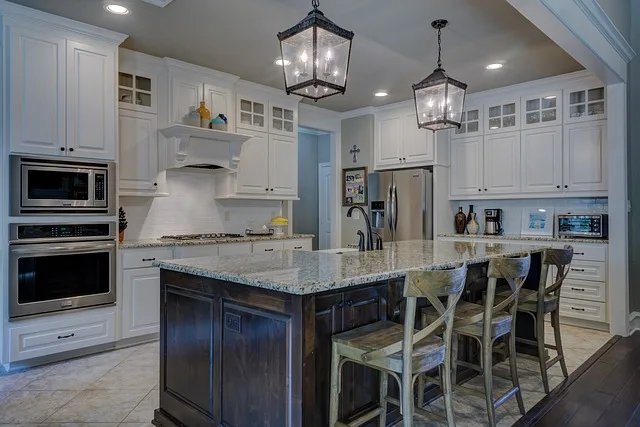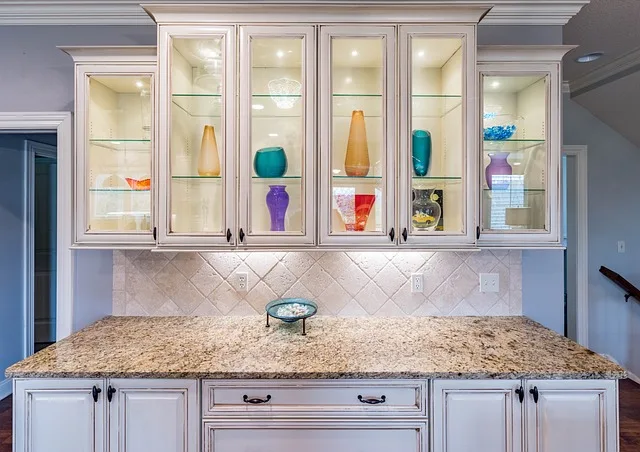Typically, standard kitchen cabinets are about 24 inches deep. This depth strikes a perfect balance, allowing you to store everything from pots and pans to those oddly shaped baking sheets without feeling like you’re playing a game of Tetris every time you reach for something. Imagine trying to fit a giant casserole dish into a cabinet that’s only 18 inches deep—frustrating, right?
Now, if you’re thinking about going custom, you might find cabinets that are deeper or shallower. For instance, some folks opt for 30-inch deep cabinets for a more spacious feel, especially in larger kitchens. It’s like upgrading from a compact car to a spacious SUV; you get more room to maneuver and store your essentials.
But let’s not forget about upper cabinets! They usually hover around 12 to 15 inches deep. This depth is perfect for storing dishes and glassware without overwhelming your kitchen space. Plus, it keeps everything within arm’s reach, so you’re not stretching like a yoga master just to grab a coffee mug.
Unlocking Kitchen Design: The Standard Depth of Kitchen Cabinets Explained
Imagine trying to cook in a kitchen where your pots and pans are crammed into cabinets that are too shallow. It’s like trying to fit a square peg in a round hole! The standard depth allows for ample storage space, making it easy to access your kitchen essentials without the hassle of digging through clutter. Plus, it creates a seamless flow in your kitchen layout, ensuring that everything is within arm’s reach.
Now, let’s talk about the visual appeal. A kitchen with cabinets that are too deep can feel overwhelming, while those that are too shallow might leave you feeling like something’s missing. The standard depth strikes that perfect balance, giving your kitchen a polished look while maximizing storage. It’s like finding the sweet spot in a recipe—just the right amount of each ingredient makes all the difference.
Beyond the Surface: Understanding the Depth of Your Kitchen Cabinets
Imagine opening your cabinet doors and finding everything you need at your fingertips. That’s the magic of smart cabinet design! The depth of your cabinets plays a crucial role in maximizing storage. Standard cabinets are usually 24 inches deep, but did you know that deeper cabinets can hold larger pots and pans? It’s like having a secret compartment in your kitchen that can accommodate all your culinary treasures.
Now, let’s talk about accessibility. Have you ever struggled to reach that elusive spice jar at the back of a shallow cabinet? Frustrating, right? By understanding the depth of your cabinets, you can choose pull-out shelves or lazy Susans that make every inch count. It’s like having a personal assistant in your kitchen, ensuring that everything is within reach.
And let’s not forget about style! The depth of your cabinets can also influence the overall look of your kitchen. Shallower cabinets can create a sleek, modern feel, while deeper ones can add a touch of traditional warmth. It’s all about finding the right balance that reflects your personality.

So, the next time you glance at your kitchen cabinets, remember: there’s more than meets the eye. By exploring their depth, you can unlock a world of organization, accessibility, and style that will elevate your cooking experience to new heights.
How Deep Should Your Kitchen Cabinets Be? A Guide for Homeowners
Standard kitchen cabinets typically come in two depths: 24 inches for base cabinets and 12 inches for wall cabinets. This setup is designed to maximize both storage and accessibility. Think of it like a well-organized closet; you want everything within arm’s reach without having to dive into the depths of chaos. If you’re planning a kitchen remodel, sticking to these dimensions can save you a lot of headaches.
But what if you have unique needs? Maybe you’re a tall chef who wants to avoid back strain while cooking. In that case, you might consider deeper base cabinets—up to 30 inches. This extra space can accommodate larger pots and pans, making your cooking experience smoother. Just remember, deeper cabinets can also mean more bending and stretching, so weigh your options carefully.
Now, let’s talk about wall cabinets. If you’re a fan of open shelving or have a smaller kitchen, you might want to go with shallower cabinets. A depth of 9 to 10 inches can create an airy feel and make your kitchen look more spacious. Plus, it’s easier to grab that coffee mug without playing a game of hide-and-seek.
The Hidden Dimensions: What You Need to Know About Kitchen Cabinet Depth

Most standard kitchen cabinets are about 24 inches deep. This depth is like the Goldilocks zone—just right for storing pots, pans, and all those gadgets you swear you’ll use one day. But here’s the kicker: not all kitchens are created equal. If you have a smaller space, you might want to consider shallower cabinets. Think of them as the perfect pair of shoes that fit just right—stylish yet functional. Shallow cabinets can make your kitchen feel more open and airy, allowing you to navigate without bumping into everything.
On the flip side, if you’re a culinary wizard with a collection of oversized cookware, deeper cabinets might be your best friend. They provide that extra room for those bulky items that just won’t fit anywhere else. It’s like having a spacious closet for your kitchen—everything has its place, and you can find what you need without digging through a mountain of stuff.
But wait, there’s more! The depth of your cabinets can also affect your countertop space. If your cabinets are too deep, you might find yourself reaching into the abyss just to grab a spice jar. It’s like trying to find a needle in a haystack! So, when planning your kitchen, think about how you use your space. Are you a minimalist or a maximalist? Your answer will guide you in choosing the perfect cabinet depth that suits your lifestyle.
From Function to Style: The Importance of Kitchen Cabinet Depth in Design
Let’s dive into the nitty-gritty. Standard kitchen cabinets typically come in depths of 12, 24, or even 30 inches. Choosing the right depth is like picking the perfect pair of jeans; it needs to fit your lifestyle and your kitchen’s layout. If you’re a culinary whiz, deeper cabinets can accommodate larger pots and pans, making your cooking experience smoother. On the flip side, shallower cabinets can create a more open feel, making your kitchen look spacious and airy.
But it’s not just about function; it’s about style too. Think of your kitchen as a stage, and the cabinets are the backdrop. A sleek, modern kitchen might benefit from shallower cabinets that align with minimalist design principles, while a traditional kitchen could embrace deeper cabinets that evoke a sense of warmth and coziness. Plus, the depth can influence how light plays in your kitchen, casting shadows and highlights that enhance the overall vibe.
Frequently Asked Questions
Are there any custom options for kitchen cabinet depth?
Custom kitchen cabinets can be tailored to various depths to meet specific design needs and space requirements. Homeowners can choose from standard depths or request modifications to optimize storage and functionality in their kitchens.
What is the standard depth of kitchen cabinets?
The typical depth of kitchen cabinets is 24 inches for base cabinets and 12 inches for wall cabinets. This standard measurement ensures optimal storage space and accessibility for kitchen items.
Can kitchen cabinet depth vary by style or design?
Yes, kitchen cabinet depth can vary based on style and design. Standard depths typically range from 12 to 24 inches, but custom designs may offer different dimensions to suit specific needs and aesthetics. It’s important to consider the overall layout and functionality when selecting cabinet depth.
How deep are upper kitchen cabinets compared to lower ones?
Upper kitchen cabinets typically have a depth of 12 to 15 inches, while lower cabinets are generally 24 inches deep. This design allows for easier access to items stored in upper cabinets and maximizes storage space in lower cabinets.
What factors influence the depth of kitchen cabinets?
The depth of kitchen cabinets is influenced by several factors including the standard dimensions of kitchen appliances, the available space in the kitchen, ergonomic considerations for ease of access, and design preferences. Additionally, the intended use of the cabinets, such as storage for larger items or maximizing counter space, can also dictate the depth chosen.